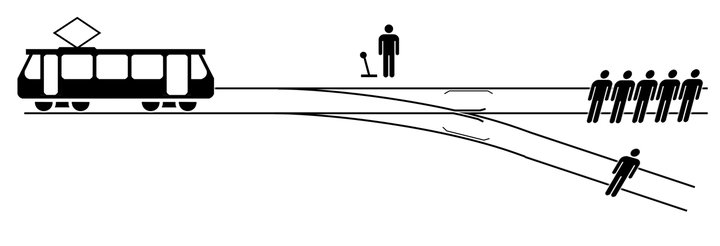You’re
probably familiar with The
Trolley Problem — it’s
one of those “morality tests” that’s been around forever
(actually, 1967). You’re standing next to a switch that can divert
an out-of-control trolley car speeding down the track. If you do
nothing, the trolley goes straight ahead, killing five workers
standing on the track. If you throw the switch, the trolley is
diverted to the other track where one worker is standing. Do you
throw the switch to kill one worker — essentially murdering him —
or do nothing, in which case you’re innocent, even though five
workers die?

Illustration: McGeddon, via Wikimedia. Creative Commons license.
Most people opt for the “throw the switch” option, perhaps reasoning, “I may be innocent, but I’m still complicit in five deaths.” Typically, if you’re taking several of these tests, you might then be asked, “Is it moral to kill one person whose organs would be harvested to save the lives of five other people who would otherwise die?” If you respond the way most folks answer, you say, “Of course not.” You’d then be asked, “What’s the difference between the trolley scenario and the organ harvesting scenario?” (Take a moment to think about this.)
These sort of morality tests irritate me, for their otherworldly and contrived scenarios. In the first example, I’d yell (loudly!). If I’m given time to throw a switch, I’d sure as hell have time to shout a warning. In the second, the implication that “society” could choose to kill the odd person to save others for some utilitarian (the greatest benefit for the most people) reason clearly sucks; I don’t live in such a society, and neither do you. (Pause to consider Hiroshima and Nagasaki…)
Here’s another, more ambiguous than the ones above. A father gets a text message: “We’ve kidnapped your 10-year old daughter. Pay the ransom without contacting the police and we set her free. Don’t pay and she’ll die.” What does he do? Here’s how philosopher Chris Edwards responds, in a recent issue of Skeptic magazine:
[The father reasons] the kidnappers have no logical reason to set the girl free. If caught, the kidnappers would be guilty of multiple felonies already and to leave the girl alive would be to risk being identified later. After they receive the money, they would have no more use for the girl and, since they hold the girl, the father really has nothing to bargain with. Should the father pay the money? Logically, no. But I would pay in this situation. Wouldn’t you? The father might surmise that his daughter has a slightly higher chance of surviving if the payment is made.
That’s how the father reasons, but what about the kidnappers? What’s their thinking? Whether or not they receive the money, killing the girl opens them to murder charges, while not killing her makes them more vulnerable to being identified. So their best option is, receive the money and kill the girl. Meaning that the worst thing the father can do is to pay the ransom.
This is another irritating (and gruesome) thought experiment that sets up a dichotomy — pay/don’t pay — as if there are no other options. There are always options! (“All problems have at least three solutions.”) Contact the police, who understand, better than the father, the situation (and who know how to trace text messages); negotiate with the kidnappers — the father has money as a bargaining chip, so he makes it clear they only get the money as a quid pro quo for the girl’s life (meet on the bridge at midnight with the money, they come with the girl); do nothing (which would rattle them); bring the girl’s mother into it before you do anything; and etc.
I’d be interested in your take on any of these far-fetched scenarios. Am I being too rational and/or cynical?
CLICK TO MANAGE